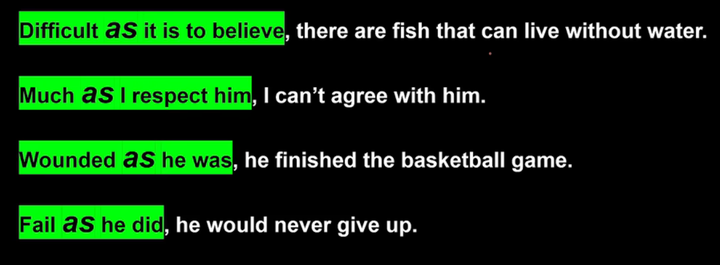【Larry】英语学习笔记语法篇——从句=连词+简单句
目录
三、从句=连词+简单句
1、必须有连词
主从结构
疑问词的词性
2、名词性从句
同位语从句
形式主语
形式宾语
that的省略
3、形容词性从句(上)
关系代词
关系词的作用
介词前置问题
4、形容词性从句(中)
定语关系限定词whose&which
5、形容词性从句(下)
限制性与非限制性
非限制性定语从句的判断
6、副词性从句
when = 时间段or时间点
as = 随着/正当/一边...一边
until(难点)
一...就...
because的否定转移问题
结果状语从句 so...that... & such...that...
比较状语从句
三、从句=连词+简单句
1、必须有连词
一个句子只能有一个谓语动词。
主从结构
e.g1 What she sai about the incident surprised everyone. 【主语从句】
What具有双重属性,整体上看它作连词连接两个句子,局部来看它是一个名词,作宾语。
e.g2 He believes that honesty is the best policy. 【表语从句】
e.g3 The fact that she won the competition delighted her family. 【同位语从句】
疑问词的词性
who(whom)n
whose adj
what n/adj
which n/adj
where adv
when adv
why adv
how adv
that n/无
2、名词性从句
名词性从句的本质是用句子代替简单句中的名词/名词短语
名词性从句分为主语从句、宾语从句、表语从句和同位语从句。
宾语从句与表语从句的区分:看符合主系表结构还是主谓宾结构。

图3.1 简单句变为从句
步骤(如图3.1):
1、调整语序(陈述句)
2、加连词(特殊疑问句不用加)
3、将连句置于句首(陈述句加that)
同位语从句
同位语是针对抽象名词的名词性解释说明。
e.g1 Michael,my friend,is a good guy. 【同位语从句】
e.g2 My favorite subject,math,requires logical thinking. 【同位语从句】
e.g3 The news,that they won the championship,spread quickly. 【同位语从句】
e.g3 I have no idea what has happened to him. 【同位语从句】
形式主语
在英语中有这么一条原则:EenWeight,即句末重心,头轻尾重。
e.g1 That Sally is beautiful is true.
e.g2 It's true that Sally is beautiful.
虽然e.g1没问题,但在英语中常常用e.g2。
形式宾语
也是因为EenWeight原则。
e.g1 I find it unbelievable that Sally is beautiful.
e.g2 I find that Sally is beautiful unreasonable.
与形式主语不同,在这两个例句中,只有e.g1是对的。没有e.g2这种用法。
that的省略
宾语从句、表语从句可省,主语从句不可省。
whether和if的互换问题
别用if,都用whether就行。
3、形容词性从句(上)
也叫定语从句,相当于一个很长的形容词,修饰先行词。
关系代词
主语关系代词:who,which,that
宾语关系代词(动词宾语):who,whom,which,that
宾语关系代词(介词宾语):who,whom,which
状语关系副词:when,where,why
定语关系限定词:whose,which
补语关系代词:which,that
*关系代词:名词性成分
*关系副词:副词性成分
*关系限定词:形容词性成分
关系词的作用
一是重复指代先行词;二是起连词作用,连接两个有独立主谓结构的简单句。
注意事项
主语关系代词:使用关系代词后,从句中原本被关系代词指代的部分(主语)必须删掉;先行词的性质=关系词的性质,保持主谓一致。
宾语关系代词:使用关系代词后,从句中原本被关系代词指代的部分(宾语)必须删掉;关系代词与从句谓语动词距离较远时,要注意分辨清楚句子的结构,一定要找到真正的谓语动词,同时把从句作为一个简单句来分析。
介词前置问题
介词后置与宾语关系词用法语言,不做分析
e.g1 The little girl who a lot of people are interested in is named Lucy. 【关系词作宾语】
e.g1的关系代词是in的名词性成分(介词短语由介词+名词构成)
e.g2 The little girl in who a lot of people are interested is named Lucy.(×)
e.g3 The little girl in whom a lot of people are interested is named Lucy.(√)
在介词前置的情况下,如果指代人,那么只能用介词+whom;如果指代物,只能用介词+which。
This is the very bag for which I've been looking(×)
look for是一个动词短语,动词短语是不可拆的。
4、形容词性从句(中)
| 关系副词 | 先行词 | 在定语从句中担当的成分 |
|---|---|---|
| where | 地点名词 | 地点状语 |
| when | 时间名词 | 时间状语 |
| why | 原因名词 | 原因状语 |
e.g1 This is the town in which I grew up
e.g2 This is the town where I grew up.
e.g1和e.g2是等价的,可互换。in which是副词属性的介词短语。in [the town] = in [which]=where
e.g3 I'll never forget the day on which I met you.
e.g4 I'll never forget the day when I met you.
e.g3和e.g4是等价的,可互换。同理,on [that day] = on [which] = when
e.g5 That is the reason for which Sally hates her friend Mary.
e.g6 That is the reason why Sally hates her friend Mary.
同上。
定语关系限定词whose&which
e.g1 Tom lives in a house of which the roof is leaking.
e.g2 Tom lives in a house whose roof is leaking.
whose既可以作人的所有格,也可以做物的所有格。
5、形容词性从句(下)
限制性与非限制性
e.g1 I don't wear clothes which make me different from other people.【which指代clothes】
我不穿那些让我看起来与众不同的衣服。
e.g2 I don't wear clothes,which makes me different from other people.【which指代“不穿衣服”这件事】
我不穿衣服,这让我与众不同。
非限定从的先行词可能是一个单词,也可能是一句话
e.g3 Beijing,which is a great city,attracts visitors from around the world.
e.g4 Beijing attracts visitors from around the world,which is great.
非限制性定语从句的判断
1、有逗号。
2、关系词只能用which(极少用that),who(极少用that),where和when。
限制性是一种筛选,众多中筛选出一个符合的。
e.g1 I still remrember the summer,when we had an unforgettable road trip.【非限制性】
e.g2 I still remrember the summer when we had an unforgettable road trip.【限制性】
当世界上只有一个东西的时候,该东西不能用限制性定语从句。
e.g3 Beijing,which is capital of China,is a great city. (√)
e.g4 Beijing which is capital of China is a great city. (×)世界上没有第二个北京,无法筛选。
6、副词性从句
本质是作为副词性成分修饰主句中的元素。
时间状语从句关系词:when(whenever),while,as,before,after,since,until
when = 时间段or时间点
e.g1 I worked hard when I was at school. (时间段)
e.g2 He became surprised when he saw me. (时间点)
while只能表示时间段,而when时间段、时间点都可以表示。
e.g3 I was walking on the road when suddenly someone stopped me. (√)
e.g4 I was walking on the road while suddenly someone stopped me. (×)stop me是短暂性动作
as = 随着/正当/一边...一边
until(难点)
【保持某种状态】until【某个时间点】
主句持续性动词肯定式 or 主句短暂性动词否定式
e.g1 He was waiting for me at my home until I came back.
e.g2 He didn't leave until I came bcak.
e.g1和e.g2意思是一样的。
拿e.g2来说,until引导的从句可提前,如e.g3
e.g3 Until I came bcak,he didn't leave.
拿e.g3来说,not也可以提前,不过这种情况要倒装,如e.g4
e.g4 Not until I came bcak did he leave.
拿e.g4来说,可以写为强调句的形式,如e..g5
e.g5 It was not until I came bcak that he left.
一...就...

图3.2 例句
because的否定转移问题
e.g1 I didn't marry her because she was beautiful.
我没和她结婚因为她漂亮。(×)
我不是因为漂亮才和她结婚的。(√)
e.g2 Sally doesn't play the piano because she likes to.
Sally不喜欢弹钢琴,因为她喜欢。(×)
Sally不是因为喜欢才弹钢琴的。(√)
具体翻译还是要看语句是否通顺。
结果状语从句 so...that... & such...that...
so是副词,修饰形容词
such是限定词,只能修饰名词
as引导的倒装结构

图3.3 例句
比较状语从句

图3.4 例句
若文章内容出现错误,恳请各位批评指正,感激不尽!
